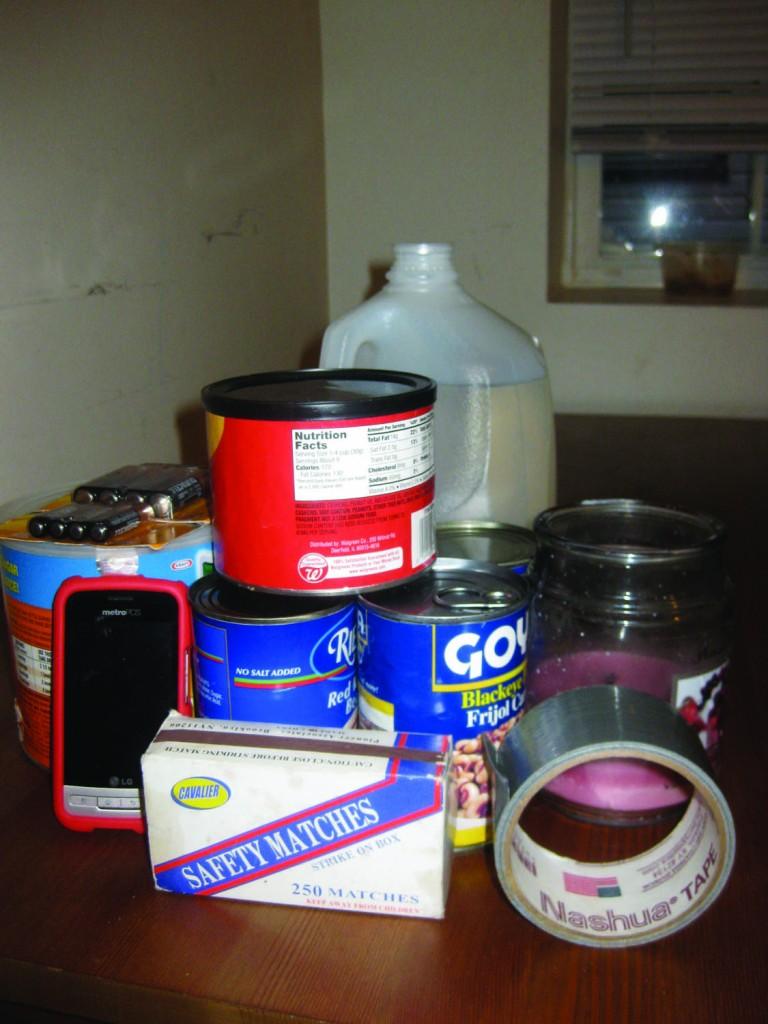It Pays to Be Prepared! Take Precautions to Keep Safe During a Disaster
It’s important to have all the necessary survival equipment in the event of an emergency. (Fatima Shabbir/The Observer)
September 21, 2011
September is National Preparedness Month, and with the recent Hurricane Irene and minor earthquake, the necessity of being well equipped in case of an emergency is more important than it might have been a few months ago.

It is becoming obvious that our climate is changing, making tropical storms and other natural disasters a frequent occurrence. The after effects of Hurricane Irene are still being felt in many regions. With varying degrees of damage throughout the East Coast, from wind damage to devastating floods and long periods of blackouts, we have seen how important it is to be ready and prepared for anything. Here is a list of ways you and your family stay safe during an emergency.
1) Have a plan
Before a storm comes, it is important to plan out where to be during the hurricane. If you are told to stay indoors, stay in the lowest level of your home, usually the basement, and keep away from windows.
If you have to evacuate, you may go to your town’s emergency shelter or simply stay at a friend’s house that is safe from the oncoming weather. Be sure to bring enough clothes, personal items, food and water. Prepare yourself in case you have to stay longer than expected-you never know how long the effects of the storm may last.
2) Get a safety kit
While preparing for Hurricane Irene, I was constantly asking my dad if he had batteries and flashlights in case of a blackout. Each time he would tell me the same thing: he has four flashlights, one for each of us with batteries ready to go.
It’s smart to have a kit ready in case of emergencies. You should have batteries, flashlights, candles, matches and a small radio. We ended up losing our electricity, so the safety kit came in handy.
3) Have non-perishable foods
Along with the safety kit, you should stock up on snacks, canned foods and water. It’s necessary to have enough supplies to last you more than a week.
4) Keep your phone charged
During the blackout, the most stressful thing I experienced was having my phone die. Being unable to charge it, I couldn’t check up on the people I cared about. This was extremely nerve-racking for me. Be sure to charge your cell phone and any other devices before the storm comes. If you are stuck with no electricity, conserve the life of the battery by using it for emergency purposes only, such as calling family members or 911.
5) Have your gas tank filled
Try to beat the crazy lines at the gas stations by filling up your car as soon as possible. Keeping it full will guarantee a quick evacuation (in case you may have to move in with a relative that lives far away).
6) Clean up the yard
Next to flooding, winds are usually the most damaging factor during a hurricane. Make sure to put away anything that may fly away such as lawn chairs, garbage cans and any yard decorations. You can secure them in your basement or in your garage.
7) Learn your town’s emergency contact
This is a great way to learn how your town prepares for an emergency. Learn who is the town’s emergency management director and where the operation office is. By learning this information, you can easily find updates on storm preparations, and where the nearest shelter is in case of an evactuation.












